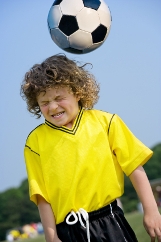Recently, the Princeton (NJ) school district became the first in the state to mandate headgear for all middle-school soccer, field hockey and lacrosse players, with plans to require it for high school athletes in the future. 
The move was a bold one, but, as someone who specializes in the treatment of sport concussion, it came as a bit of a surprise. While headgear may reduce lacerations and skull fractures, there is currently no research to show that headgear in sports such as soccer, field hockey or girl's lacrosse actually reduce the incidence of concussion, especially since many concussions occur without a direct blow to the head but from a body blow that produces a whiplash, snapback or twisting effect.
Like some other concussion experts who have weighed in on Princeton's controversial move, I also worry about the false sense of security that young athletes may feel wearing the new headgear, which can lead them to play harder or more aggressively, paradoxically increasing their injury risk.
None of the articles I have read on Princeton's actions address on what I believe we really need to focus on. In my view, here's what we need more:
- Kids need to really understand what a concussion is and that it is serious.
- Parents need to focus on safety and skill development, not winning at all costs.
- Coaches need to be to trained in the most up-to-date techniques that promote smart play and reduce risk.
- Game officials not only need be well-trained and compensated but to strictly enforce safety rules and exhibit zero tolerance for aggression and unnecessarily risky tactics.
- Schools need to hire multiple athletic trainers. Right now, less than half of all high schools in the US even have access to an athletic trainer. Some schools are lucky to have one. Some are part time. But, they surely cannot be at every game and every field in one afternoon. So they lack protection.
- Age-appropriate rules need to be enacted. The rules and play of the games at the younger youth level need to change. In soccer, heading the ball before high school, when young necks are not yet strong enough or well-developed, is not necessary. I have seen too many young athletes suffer repeated concussions and be forced to retirefrom contact sports before they even make it to high school.
- Properly conducted baseline testing. We also need to take a critical look at how baseline and post-concussion testing is done in our schools. These tests are often misused, misinterpreted, not checked for validity, and poorly administered because schools do not have funding to adequately carry out these testing programs. These tests are neuropsychological, brain function tests that are mostly being used by athletic and school personnel, who now have the additional burden of carrying out these programs, and who are not trained in brain-behavior functions. It is a great thing that schools are promoting baseline testing, but the problem is lack of funding to adequately oversee, administer and execute the program so that it is maximally useful and helpful. I see too many youth athletes who come to my office for concussion treatment with their baselines in hand from their schools, only to realize that the baselines are invalid and we cannot use them.
Bottom line: youth sports need to be exactly that: sports for kids, not professional sports. If we start kids out early, believing that sports are for fun, team-building, and strategic thinking, and that one should play in a way that always avoids injury at all costs, then we will have healthier youth with healthier brains who can enjoy long academic and sports careers.
As a sports mom, neuropsychologist, researcher, and concussion expert, who raised her kids in Princeton, my motto has always been and continues to be, "Love your brain...love your sport."
Posted August 18, 2013








